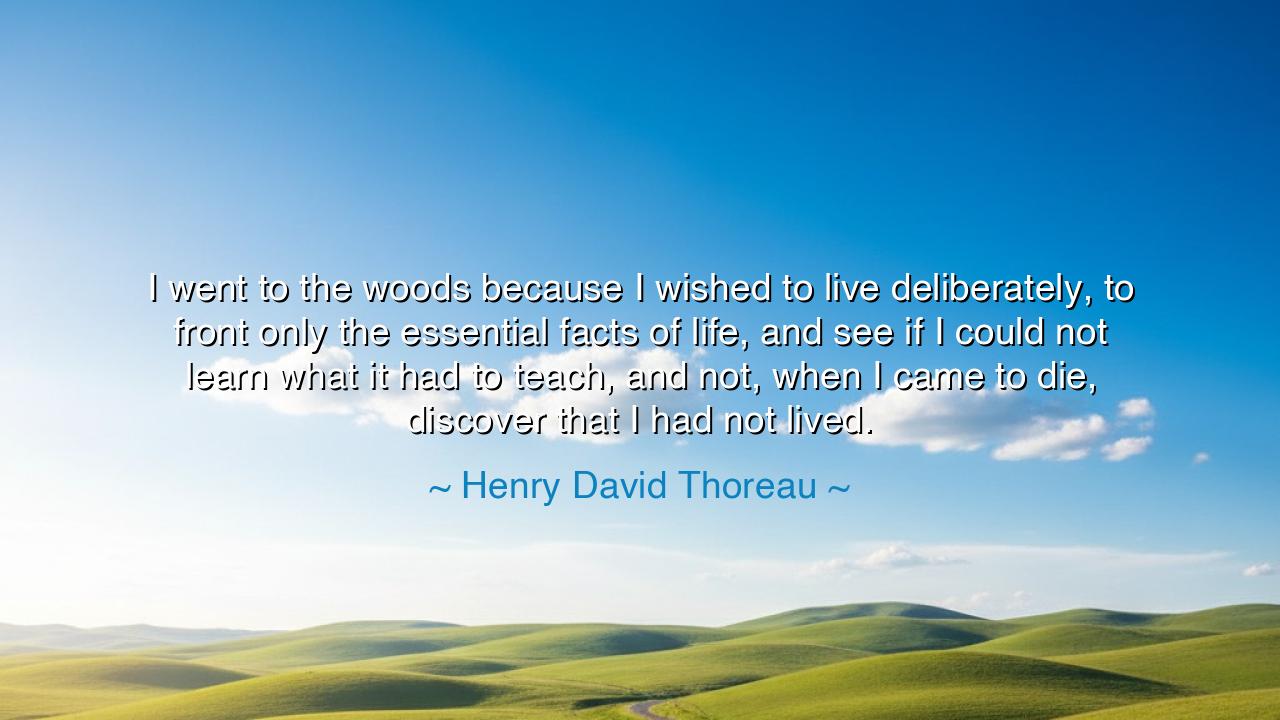
I went to the woods because I wished to live deliberately, to
I went to the woods because I wished to live deliberately, to front only the essential facts of life, and see if I could not learn what it had to teach, and not, when I came to die, discover that I had not lived.






In the ancient windswept plains of human existence, where the soul longs for meaning and the heart yearns for clarity, there is a profound wisdom in living deliberately. Henry David Thoreau, the philosopher and poet of the wilds, speaks to this eternal truth when he writes, "I went to the woods because I wished to live deliberately, to front only the essential facts of life, and see if I could not learn what it had to teach, and not, when I came to die, discover that I had not lived." These words echo through the ages, calling forth those who are caught in the distractions of daily life, urging them to strip away the unnecessary and seek out the core truths that lie beneath the surface.
Thoreau’s retreat to the woods, to the stillness of nature, was an act of profound purpose. In a world that often inundates the soul with noise, clutter, and the demands of others, Thoreau chose solitude to connect with the essential facts of life—the bare truths that speak to the heart of our existence. In his journey, he sought to understand what life truly has to teach, free from the superficial distractions that often cloud our vision. This quest was not just about physical solitude, but about spiritual clarity—about stripping away the layers of social expectations and external pressures to find the truth that lives within.
In the ancient traditions, the idea of living deliberately was seen as the highest form of existence. The Greek philosophers spoke of eudaimonia, the state of flourishing that comes from living in accordance with virtue and wisdom. Socrates famously said, "An unexamined life is not worth living." To live deliberately is to examine one’s own life, to consciously choose one’s path, and to reject the path of least resistance. Thoreau echoed this sentiment, recognizing that life is not simply a series of days to be endured, but a journey to be embraced with purpose and clarity. His retreat to the woods was not an escape from the world, but a return to its most fundamental truths.
Consider the story of Siddhartha Gautama, who left his life of luxury and comfort to seek enlightenment. Much like Thoreau, Siddhartha yearned to face only the essential facts of life—to understand the nature of suffering, desire, and existence. His journey into the wilderness was a deliberate choice to shed the trappings of wealth and status, to see life as it truly was, without the distractions of societal expectations. In his meditation beneath the Bodhi tree, Siddhartha found the wisdom he sought, and in that moment, he became the Buddha—one who understood the profound truths of existence, not through external achievements, but through an inward journey of deliberate living.
In our modern world, the lessons of Thoreau and Buddha remain as relevant as ever. We are inundated with distractions: the constant buzz of technology, the pressures of success, the need for approval from others. Many of us, like Thoreau, find ourselves trapped in a life of routine, chasing after fleeting pleasures and material gains. We are constantly moving, constantly achieving, but are we truly living? Thoreau’s question is one that each of us must ask ourselves: Have we lived deliberately, or have we simply gone through the motions, only to look back at the end of our days and realize we missed the very heart of life?
The wisdom of Thoreau calls us to action. To live deliberately is to choose, each day, to confront the essential facts of life—to embrace the simplicity, beauty, and challenges that lie before us, without getting lost in the noise. It is to engage with life in a way that is meaningful and purposeful. It is about rejecting the distractions that rob us of our time and energy and focusing on what truly matters—our relationships, our inner growth, and our connection to the world around us. The lesson is clear: Life is too precious to be spent in mindless pursuit; we must live with intention, with awareness, and with purpose.
In your own life, consider how often you find yourself swept along by the currents of external demands, without truly asking if this is the life you are meant to live. Take a moment, as Thoreau did, to retreat from the noise and distractions, even if only for a short while. Seek out the essential facts of life—the things that bring you peace, purpose, and clarity. Reflect on your choices, and ask yourself if you are truly living in alignment with your values. Deliberate living is not just about moments of solitude but about making each moment a conscious choice to live in a way that honors the deepest truths of your soul.
Let the wisdom of Thoreau guide you. Live deliberately—not just in the big moments, but in the small, everyday choices. Seek the truths that lie beneath the surface, and allow them to lead you to a life that is fully lived. When the end comes, may you look back not with regret, but with the satisfaction of knowing you lived with purpose, clarity, and intention, embracing the world as it truly is.






AAdministratorAdministrator
Welcome, honored guests. Please leave a comment, we will respond soon